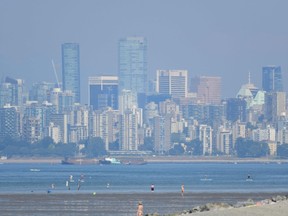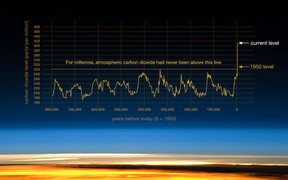Article content
It’s a new year with new policies expected aimed at tackling the inextricably linked climate and ecological crises. Here is your weekly roundup of all the latest news concerning climate change, biodiversity loss, and the steps leaders are taking to address these issues.
Article content
• First Nation fights to quash environmental approval for $885-million petroleum facility
• 2022 was the planet’s fifth warmest on record, say scientists
• A study finds Exxon Mobil accurately predicted warming since 1970s, while denying it
The UN’s Intergovernmental Panel on Climate Change has warned for a decade that wildfires, drought, severe weather, such as B.C.’s deadly heat dome and catastrophic flooding in 2021, would become more frequent and more intense because of the climate crisis.
The panel has issued a “code red” for humanity and last year it said the window to stop global warming from exceeding 1.5 C was closing. In April 2022, it released a report with solutions for how to drive down greenhouse gas emissions, mainly by transitioning away from fossil fuels.
Article content
There is a scientific consensus on climate change (NASA reports that 97 per cent of climate scientists agree that the climate is warming and that human activity is the cause.) Multiple studies published in peer-reviewed scientific journals show that greenhouse gas emissions are the primary cause of global warming.
Check back here every Saturday for a roundup of the latest climate and environmental stories. You can also get up to date B.C.-focussed news delivered to your inbox by 7 a.m. by subscribing to our newsletter here.
A glance at B.C.’s carbon numbers:
- B.C.’s gross greenhouse gas (GHG) emissions in 2020 (latest available data) were 64.6 million tonnes of carbon dioxide equivalent (MtCO2e). This is a decrease of 0.9 MtCO2e (one per cent) from 65.5 MtCO2e in 2007, the baseline year for emissions reduction targets.
- B.C.’s net greenhouse gas (GHG) emissions in 2020 were 63.5 million tonnes of carbon dioxide equivalent (MtCO2e.) This is a net decrease of 2.0 MtCO2e, or three per cent, since 2007.
- B.C.’s net emissions in 2019: 67.2 MtCO2e, an increase of 1.5 MtCO2e, or two per cent, since 2007.
- B.C.’s 2030 target: 40 per cent reduction in net emissions below 2007 levels.
- B.C.’s 2040 target: 60 per cent reduction.
- B.C.’s 2050 target: 80 per cent reduction.
- Canada’s 2030 emissions target: Between 40 and 45 per cent reduction.
- Canada’s 2050 emissions target: Net-zero.
(source: B.C. and Canadian governments)
Article content
Climate change quick facts:
- The Earth is now about 1.1 C warmer than it was in the 1800s.
- 2022 was the planet’s fifth warmest year on record
- Human activities have raised atmospheric concentrations of CO2 by nearly 49 per cent above pre-industrial levels starting in 1850.
- The world is not on track to meet the Paris Agreement target to keep global temperature from exceeding 1.5 C above pre-industrial levels, the upper limit to avoid the worst fallout from climate change.
- 2015-2019 were the five warmest years on record while 2010-2019 was the warmest decade on record.
- On the current path of carbon dioxide emissions, the temperature could increase by as much as 4.4 C by the end of the century.
- In April, 2022 greenhouse gas concentrations reached record new highs and show no sign of slowing.
- Emissions must drop 7.6 per cent per year from 2020 to 2030 to keep temperatures from exceeding 1.5 C and 2.7 per cent per year to stay below 2 C.
- 97% of climate scientists agree that the climate is warming and that human beings are the cause.
(Source: United Nations IPCC, World Meteorological Organization,UNEP, Nasa, climatedata.ca)
Article content
LATEST CLIMATE NEWS

Scientists say 2022 was 17th hottest on record in Canada, fifth globally
Scientists say 2022 was the 17th hottest year on record in Canada, and the Earth’s fifth warmest, as the “code red” climate emergency—fuelled by human-caused greenhouse gas emissions—continues to escalate.
Canada last year was 1.2 C warmer than was typical about 60 years ago, said Robert Rohde, the lead scientist at Berkeley Earth, a California-based organization that conducts temperature data analysis.
So, the 17th warmest year was “well above average, but not near the peak,” he said, adding that 2021 in Canada was almost a degree warmer than 2022, and the fifth warmest year on record.
That was the year of B.C.’s deadly heat dome, which pushed temperatures into the 40s, including a record high temperature of 49.6 C in Lytton, one day before the village burned down from wildfire.
In a report earlier this week, Berkeley Earth says 2022 was the planet’s fifth hottest since 1850, driven largely by extreme heat waves in Europe last summer.
—Tiffany Crawford
Study: Exxon Mobil accurately predicted warming since 1970s
Exxon Mobil’s scientists were remarkably accurate in their predictions about global warming, even as the company made public statements that contradicted its own scientists’ conclusions, a new study says.
The study in the journal Science Thursday looked at research that Exxon funded that didn’t just confirm what climate scientists were saying, but used more than a dozen different computer models that forecast the coming warming with precision equal to or better than government and academic scientists.
This was during the same time that the oil giant publicly doubted that warming was real and dismissed climate models’ accuracy. Exxon said its understanding of climate change evolved over the years and that critics are misunderstanding its earlier research.
Scientists, governments, activists and news sites, including Inside Climate News and the Los Angeles Times, several years ago reported that “Exxon knew” about the science of climate change since about 1977 all while publicly casting doubt.
What the new study does is detail how accurate Exxon funded research was. From 63% to 83% of those projections fit strict standards for accuracy and generally predicted correctly that the globe would warm about .36 degrees (.2 degrees Celsius) a decade.
—The Associated Press
First Nation fights to quash environmental approval for $885-million petroleum facility
The Metlakatla First Nation has filed a federal court petition to quash an environmental review approval of Dutch company Vopak’s $885-million bulk liquid petroleum storage facility in northwest B.C.
The facility — the second facility for the company on Ridley Island near Prince Rupert — would store and load products such as light diesel, gasoline, butane and methanol for its customers to ship by sea to Asia, as well as to Central and South America.
In its court filing last month, the 1,000-member First Nation cited significant concerns over greenhouse gas emissions from the project and its effect on climate change, and on air quality and wetlands.
Filed on behalf of Metlakatla chief Harold Leighton against the Attorney-General of Canada and the Prince Rupert Port Authority, the petition says the First Nation’s concerns were not meaningfully addressed during the review.
In a written response Tuesday, Canadian government officials said only that Canada intends to appear in court to respond to the petition.
—Gord Hoekstra
UAE names oil boss to lead climate summit, worrying activists
The United Arab Emirates said on Thursday that the head of state oil giant Abu Dhabi National Oil Company would lead this year’s COP28 climate summit, fueling activists’ worries that big industry is hijacking the global response to environmental crisis.
Sultan al-Jaber, also UAE’s minister of industry and technology and its climate envoy, will help shape the conference’s agenda and intergovernmental negotiations to build consensus, his office said in a statement.
The UAE, a major OPEC oil exporter, will be the second Arab state to host the climate conference after Egypt in 2022.
Campaigners and some delegates criticized COP27, saying fossil fuel producers had watered down emission reduction ambitions and benefited from sympathetic treatment from Egypt, a natural gas exporter and frequent recipient of Gulf funds.
—Reuters
‘Wave of crises’ threaten climate action and social stability
An avalanche of immediate crises – from Russia’s Ukraine war to soaring energy and food prices and worsening debt – are delaying action on major risks like climate change and threatening to fuel growing societal breakdown, analysts have warned.
Meanwhile, trust in governments – and even agreement on basic facts – are waning in the face of disinformation, while cyber dangers are rising, making tackling threats from climate change to ecosystem breakdown and rising inequality more difficult and raising the risk some will become unmanageable, they said.
“Wave after wave of crises is creating an incredibly challenging environment for leaders,” said Saadia Zahidi, managing director of the World Economic Forum (WEF), which released its annual risk ranking on Wednesday, ahead of its Davos meeting starting next week.
“In this extremely fragile environment, if there were to be another shock… it may be unmanageable,” she warned.
—Reuters
EU should agree remaining climate laws by summer, Sweden says
The European Union aims to finish negotiations by July on laws to deliver its 2030 climate change target, although a contentious overhaul of fossil fuel taxes will likely take longer, Sweden’s ambassadors to the bloc said on Monday.
The 27-country EU is in the final stretch of negotiating roughly a dozen laws to fight global warming, and last year struck deals on most, including a 2035 ban on sales of new fossil fuel cars and a major overhaul of its carbon market.
Sweden, which now holds the EU’s rotating presidency and will chair negotiations among member countries until July, wants to finalize tougher targets for renewable energy and energy efficiency and minimum energy performance standards for buildings, as well as requirements for airlines to use more green fuel.
“We will try to make that complete, so that during the first part of this year, we can state that the Fit for 55 package has been brought to a successful end in terms of the legislative work,” Torbjörn Haak, Sweden’s deputy ambassador to the EU, told reporters in Brussels.
Haak said that for now Sweden was not anticipating new emergency proposals to cope with the fallout of Russia slashing its gas flows to Europe, after EU countries agreed emergency measures last year including a gas price cap and storage filling requirements.
—Reuters

Article content
Here are some of the Canadian climate change legal challenges to watch in 2023
Sierra Club B.C. V B.C. government
The lawsuit, filed by Ecojustice on behalf of the Sierra Club B.C. in March, alleges the government’s plan falls woefully short by failing to include a plan for the 2025, 2040 and 2050 climate targets, and leaves out details on how it plans to cut carbon gases from the oil-and-gas sector.
The B.C. government has argued that this case doesn’t belong in court and should be thrown out. It argues that issues raised in the lawsuit amount to a difference of opinion and are not matters that belong in the courts.
A decision on this case is pending since a hearing in October. It could take six months to a year.
Mathur et al. V Ontario
A ruling is expected this year in a landmark climate lawsuit in Ontario. Seven young people, led by teen climate activist Sophia Mathur, are challenging the Ontario government’s rollback of its 2030 greenhouse gas emissions reduction target.
On April 15, 2020, the government filed a motion to strike the case, arguing it should not proceed to a full hearing. The youth applicants countered this motion in July that year.
This led to a historic win. For the first time in Canadian history, the court recognized that climate change has the potential to violate Charter rights and gave the youth the greenlight to move ahead to a full hearing, according to Ecojustice.
The Ontario government then tried to overturn this ruling, but in March 2021 the Ontario Divisional Court dismissed the province’s request to appeal.
That means this is the first case of its kind to proceed to a full hearing before Ontario Superior Court. The youth now await a decision from the court.
—Tiffany Crawford





